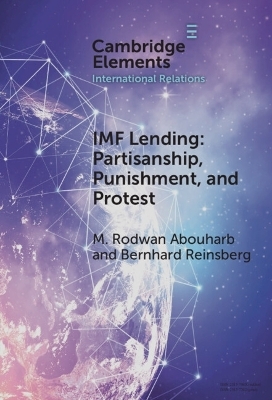
IMF Lending
Partisanship, Punishment, and Protest
Seiten
2024
Cambridge University Press (Verlag)
978-1-009-45115-4 (ISBN)
Cambridge University Press (Verlag)
978-1-009-45115-4 (ISBN)
This Element argues that governments allocate adjustment burdens strategically to protect their supporters. Using large-N micro-level survey data from three world regions and a global survey, the Element discusses the local political economy of IMF lending. This title is also available as Open Access on Cambridge Core.
This Element argues that governments allocate adjustment burdens strategically to protect their supporters, imposing adjustment costs upon the supporters of their opponents, who then protest in response. Using large-N micro-level survey data from three world regions and a global survey, it discusses the local political economy of International Monetary Fund (IMF) lending. It finds that opposition supporters in countries under IMF structural adjustment programs (SAP) are more likely to report that the IMF SAP increased economic hardships than government supporters and countries without IMF exposure. In addition, it finds that partisan gaps in IMF SAP evaluations widen in IMF program countries with an above-median number of conditions, suggesting that opposition supporters face heavier adjustment burdens, and that opposition supporters who think SAPs made their lives worse are more likely to protest. This title is also available as Open Access on Cambridge Core.
This Element argues that governments allocate adjustment burdens strategically to protect their supporters, imposing adjustment costs upon the supporters of their opponents, who then protest in response. Using large-N micro-level survey data from three world regions and a global survey, it discusses the local political economy of International Monetary Fund (IMF) lending. It finds that opposition supporters in countries under IMF structural adjustment programs (SAP) are more likely to report that the IMF SAP increased economic hardships than government supporters and countries without IMF exposure. In addition, it finds that partisan gaps in IMF SAP evaluations widen in IMF program countries with an above-median number of conditions, suggesting that opposition supporters face heavier adjustment burdens, and that opposition supporters who think SAPs made their lives worse are more likely to protest. This title is also available as Open Access on Cambridge Core.
1. Introduction; 2. Theoretical framework; 3. Data; 4. How IMF programs affect distributive politics; 5. How distributive politics under IMF programs affect protest; 6. Discussion and conclusion; References; Appendices.
| Erscheinungsdatum | 01.10.2024 |
|---|---|
| Reihe/Serie | Elements in International Relations |
| Zusatzinfo | Worked examples or Exercises |
| Verlagsort | Cambridge |
| Sprache | englisch |
| Gewicht | 325 g |
| Themenwelt | Sozialwissenschaften ► Politik / Verwaltung ► Europäische / Internationale Politik |
| Wirtschaft ► Volkswirtschaftslehre ► Makroökonomie | |
| Wirtschaft ► Volkswirtschaftslehre ► Wirtschaftspolitik | |
| ISBN-10 | 1-009-45115-4 / 1009451154 |
| ISBN-13 | 978-1-009-45115-4 / 9781009451154 |
| Zustand | Neuware |
| Informationen gemäß Produktsicherheitsverordnung (GPSR) | |
| Haben Sie eine Frage zum Produkt? |
Mehr entdecken
aus dem Bereich
aus dem Bereich
Studienbuch
Buch | Hardcover (2023)
De Gruyter Oldenbourg (Verlag)
CHF 62,90
Amerikas Strategie der Vorherrschaft und der Kampf um Eurasien
Buch | Softcover (2024)
NOMEN Verlag
CHF 27,95


